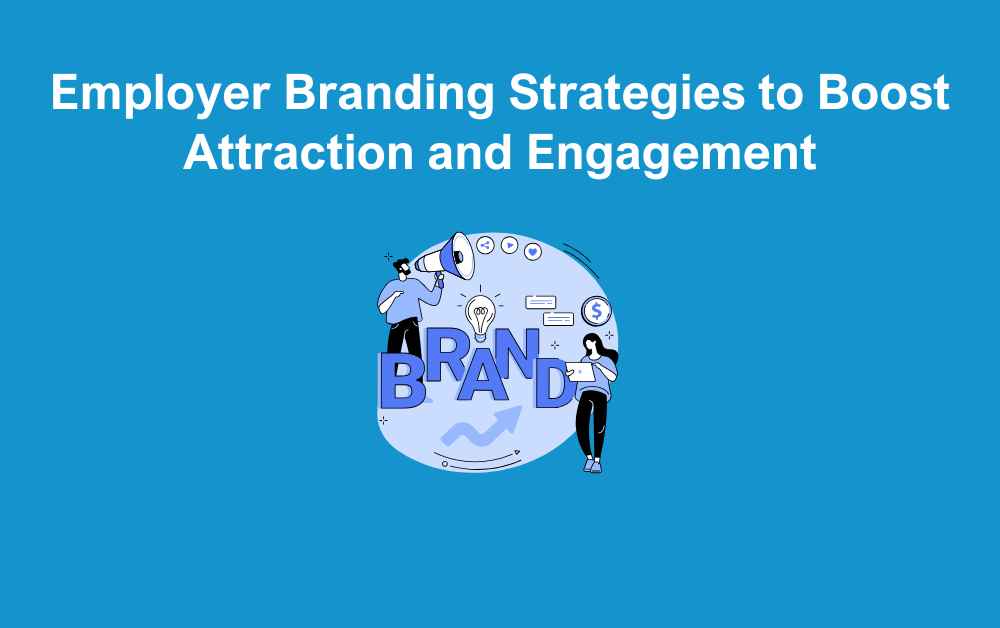Building strong employer brand strategies is just as important as getting your corporate brand right. It’s what helps you attract top talent, keep your best people and create a motivated, loyal team. Too often, businesses pour all their energy into their corporate brand, making sure customers see them in the best light. However, the employer brand usually takes a back seat. The truth is, the two go hand in hand. If people do not see your business as a great place to work, it will eventually affect how they see you as a business too. Both need to be strong and positive to support each other. Get it right, and you will not only build trust and loyalty but also set yourself apart from the competition where it really matters.
In this article, we will guide you through the key steps to creating a brand that draws in the best talent and keeps them engaged.
What Is Employer Branding?
Employer branding is the process of shaping how current employees and potential candidates view your company. It is your reputation as an employer and the value you offer to your workforce. Successful employer branding strategies highlight your company’s culture, mission, and employee experience in a way that resonates with the talent you want to attract.
Why Are Employer Branding Strategies Important?
Businesses who prioritise their employees and focus on improving the workplace benefit from:
-
Attracting high-quality candidates
-
Reducing hiring costs
-
Improving employee retention
-
Enhancing company culture
-
Building a positive reputation in the market
In short, a strong employer brand helps your business grow by ensuring you have the right people in the right roles.
How to Create Effective Employer Branding Strategies
Building successful employer branding strategies takes time, but the results are worth the effort. Here’s how you can get started:
1. Define Your Employer Value Proposition (EVP)
Your Employer Value Proposition (EVP) is the unique set of benefits and values that you offer employees. It should clearly explain why someone should want to work for your business over another.
Consider these questions:
-
What makes your company a great place to work?
-
What do current employees value most?
-
How do you support career development, wellbeing and work-life balance?
Once you have a strong EVP, weave it into all your communication channels, from job adverts to your careers page.
2. Sharing Your Mission, Values and Culture Matters
Sharing your mission, values and culture is one of the strongest employer branding strategies. It helps candidates connect with your business on a deeper level, shows what makes you different and builds trust from the start. People are not just looking for a job – they want to feel part of something meaningful. By clearly promoting what you stand for, you will attract the right talent, boost engagement and create a loyal team that truly believes in your business.
At The HR Booth, we have brought our values to life by displaying them proudly on the walls of our office, giving our team a daily reminder of what we believe in and what drives us. Our Values focus on:
- Building Relationships
- Prioritising Quality
- Personal Development
- Trust
- Solutions Minded
- Agile and Responsiveness
3. Showcase Your Company Culture
People want to see what working at your company is really like. As part of the employer branding strategies, share real stories, employee testimonials, behind-the-scenes videos and day-in-the-life posts across your website and social media channels. Transparency builds trust and gives candidates a glimpse into your company culture.
If you offer flexible working, growth opportunities, a foster a collaborative and supportive atmosphere, it’s important to share this. Regularly keep your team updated on benefits and ensure they fully embrace them. Share company news, celebrate individual successes and show how your offering stands out from competitors to keep morale and loyalty high.
4. Focus on Personal Development
Employees are drawn to businesses that invest in their growth. Offering training programmes, mentorship, leadership development and clear career pathways shows that you are serious about helping your people achieve their goals. Personal development not only improves skills across your business but also increases engagement and loyalty.
5. Implement Reward and Recognition Schemes
Recognising and rewarding hard work plays a huge part in how employees feel about your company. Implementing reward schemes as part of your employer branding strategies – whether through bonuses, awards or simple day-to-day recognition – helps employees feel valued and motivated. Make sure your reward system is fair, transparent and linked to your company values.
6. Prioritise Employee Wellbeing
A strong employer brand shows that you care about your people both inside and outside of work. Prioritise wellbeing through initiatives like mental health support, flexible working, access to wellness resources and a healthy work-life balance. Employees who feel supported in all areas of their lives are more likely to be engaged and committed.
7. Be Consistent
Consistency is key when it comes to employer branding strategies. Make sure the messages you share externally match the reality employees experience internally. Authenticity builds trust. If your employer brand promises growth, support and recognition, your people should see and feel that every day.
8. Use Your Employees as Brand Ambassadors
Your current employees are your best advocates. Encourage them to share their experiences on social media, attend industry events, and participate in employer branding campaigns. Employee advocacy adds authenticity and credibility.
9. Optimise Your Careers Page
Your careers page is often the first point of contact for potential candidates. Make sure it clearly reflects your brand, showcases your EVP, and highlights available opportunities. Include engaging content such as videos, testimonials and a strong call-to-action to encourage applications.
10. Engage with Candidates Throughout the Recruitment Process
Every interaction with a candidate shapes their impression of your company. Provide a positive candidate experience by:
-
Communicating clearly and regularly
-
Offering feedback at each stage
-
Respecting candidates’ time
Even if someone is not successful, a positive experience can lead to future applications or referrals.
11. Measure and Improve
Monitor the performance of your employer branding strategies by tracking metrics such as:
-
Application rates
-
Quality of hire
-
Retention rates
-
Employee engagement scores
-
Employer review site ratings
Use this data to refine your approach and continuously improve your employer brand.
Final Thoughts
Creating strong employer branding strategies is essential if you want to attract and retain top talent. By clearly defining your EVP, showcasing your company culture and engaging with candidates authentically, you can build a reputation as an employer of choice. In a competitive market, investing in your employer brand is not just a nice-to-have – it is a business necessity.
Contact Us
If you would like support from our HR Consultants to improve your employer brand strategies, contact us now. We are here to help you build a brand that stands out for all the right reasons.







